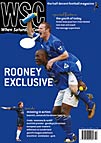 There is a new management team at Sunderland and Joe Boyle looks at how their coaching qualifications might fair in comparison to findings from a recent book
There is a new management team at Sunderland and Joe Boyle looks at how their coaching qualifications might fair in comparison to findings from a recent book
“Preparation, practice and training.” This is Howard Wilkinson’s way. After that, you’ll get some flair. As the Stadium of Light mustered one final groan at the end of Wilkinson’s first game in charge at Sunderland, the 1-0 defeat against West Ham, it was clear his players were set for a large dose of preparation, practice and training. Give me time, Wilkinson said afterwards. But, as Chris Green’s new book The Sack Race makes clear, time is something managers don’t have. Fifteen months is the average tenure in a job which, in Green’s account, offers long nights, sapping journeys up Britain’s motorways and the inevitable chop from a scapegoat-hunting boardroom.
Conscious of the mess Wilkinson inherited, the boos after the West Ham defeat were more a Pavlovian response than genuine anger. Had Peter Reid still been in charge, the reaction would have been different. His bullishness and quick wit had worn off for most fans. More importantly, the plc had grown tired too, their patience seeping away over 18 dire months. Despite howls of protest from his media buddies, Reid’s dismissal was not a knee-jerk reaction of the type that Green bemoans.
The level of dissatisfaction with Reid explains why the appointment of Wilkinson and Steve Cotterill was acknowledged by most Sunderland fans as a clever gamble, once the initial surprise had worn off. Even sceptics acknowledged that the new pair were, primarily, coaches, holders of UEFA’s Pro Licence, Europe’s highest coaching qualification. This offered a refreshing contrast to Reid’s last days. Reports from the Whitburn training complex spoke of desultory practice sessions, a diet of head-tennis and bust-ups with players who questioned the coaching. The final straw was Reid’s response to last year’s near relegation. Promising wide-scale reform, all he actually did was promote one pal, the uninspiring Adrian Heath, to head coach and appoint another, Niall Quinn, as player-coach, despite the Irishman’s lack of any coaching background. As Wilkinson tells Green: “Character is perceived as more important than qualifications.”
Well, Reid, all character, has gone and Wilkinson, all qualifications, has a chance to prove his worth. But it is Cotterill’s arrival that has most interested the Sunderland fans. The achievements of the academic Wenger and Houllier, the emergence of David Moyes (who also holds the Pro Licence, one of just 12 coaches in England to do so) and the World Cup success of South Korea, limited but brilliantly coached, have not been lost on them. Proper coaching can turn good players into great players and ordinary players into good ones. Sunderland have lots of ordinary players.
The 240 hour long Pro Licence course involves studying numerous coaching approaches, as well as a range of related disciplines, from communication skills to diet to psychology. “It is,” says Wilkinson, “very much a think tank. They’re on the course together, they speak to each other, and they cross-fertilise ideas among each other.”
This is weighty stuff requiring intellectual flexibility and an awareness that your reputation as a player says nothing about your ability as a coach. Unsurprisingly, there is resistance within the game. The former Wolves player Kenny Hibbitt, who has managed Walsall, Cardiff and Hednesford Town, says: “If my son went to a centre of excellence I would want him to be taught by an ex-professional. Otherwise he doesn’t go.” Depressed by this attitude, Green finds comfort in Wilkinson’s riposte. “I know lots of people who have driven cars for 20 years,” he says. “I wouldn’t say they can teach other people to drive.”
Despite a few gaps (there could be more on the finer details of a coach’s role on the training ground) and some heavy-handed humour, this is a thoughtful and well-researched book, full of good anecdotes and historical insight. It is sustained throughout by the passionate belief in the value of qualified coaches. Wilkinson, pointing out that the various England sides he managed only conceded one goal from a set-piece in 37 games, asks: “Is it because I’ve been lucky, or because the way I see critical issues in set-pieces must be right?” Sunderland fans will be hoping it’s because he’s right.
From WSC 190 December 2002. What was happening this month